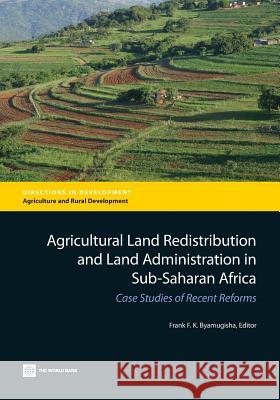Agricultural Land Redistribution and Land Administration in Sub-Saharan Africa: Case Studies of Recent Reforms » książka
Agricultural Land Redistribution and Land Administration in Sub-Saharan Africa: Case Studies of Recent Reforms
ISBN-13: 9781464801884 / Angielski / Miękka / 2014 / 150 str.
Agricultural Land Redistribution and Land Administration in Sub-Saharan Africa: Case Studies of Recent Reforms
ISBN-13: 9781464801884 / Angielski / Miękka / 2014 / 150 str.
(netto: 116,57 VAT: 5%)
Najniższa cena z 30 dni: 120,90
ok. 22 dni roboczych.
Darmowa dostawa!
Agricultural Land Redistribution and Land Administration in Sub-Saharan Africa: Case Studies of Recent Reforms focuses on "how" to undertake land reforms in Sub-Saharan Africa, but with relevant lessons for other developing countries. It provides details, with case studies, on how reforms were undertaken to address a pressing and controversial development challenge in Africa - land ownership inequality - and an intransigent development issue - inefficiency and corruption in land administration. An equally important contribution of the book is assessing reforms and highlighting valuable lessons for other countries contemplating reforms. The six case studies collectively cover two main areas of land governance: reforms in redistributing agricultural land and reforms in land administration. The first two case studies discuss reforms in redistributing agricultural land in Malawi and South Africa, part of the southern Africa region where land ownership inequalities rival those in Latin America. The remaining case studies, four in number, are focused on addressing corruption and inefficiency in land administration in a variety of contexts of governance including stable and post-conflict countries. The case studies cover: - Decentralizing land administration with demonstrations from Uganda, Ethiopia, Tanzania, and Ghana; - Developing post-conflict land administration systems with examples from Liberia and Rwanda; - Re-engineering and computerizing land information systems with examples from Ghana and Uganda; and - Improving management of government land through land inventories with examples drawn from Ghana and Uganda. The common elements between sometimes disparate experiences provide lessons of relevance to African and other developing countries contemplating similar reforms. The rigorous analysis and yet down-to-earth lessons of experience are a reflection of the authors' deep global experience underpinned by personal participation in the reforms covered by the book. This volume will be of interest to a wide audience including land specialists and practitioners, African policy makers, experts and managers in the international development community, and the academia.











